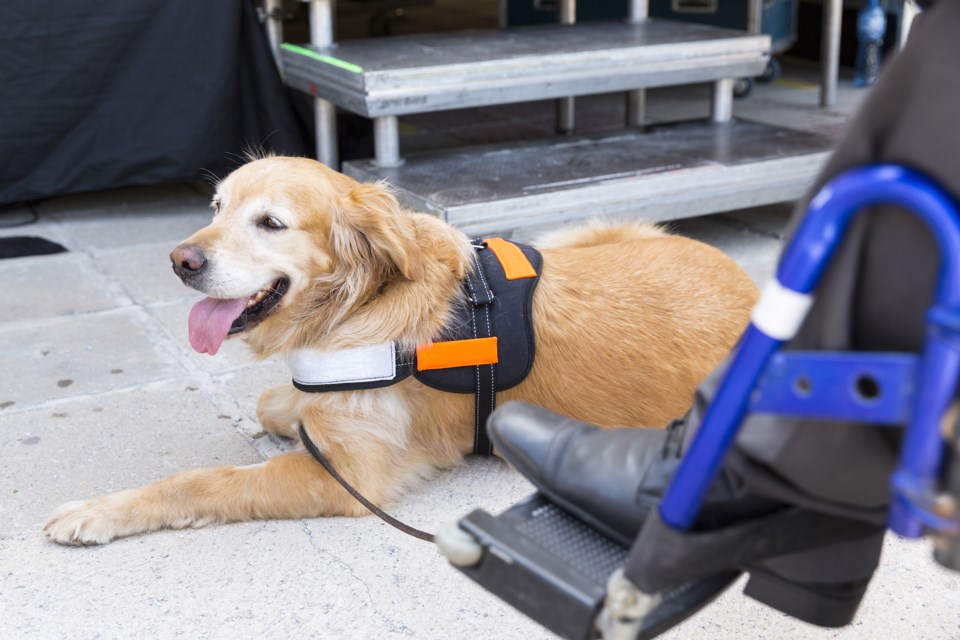NEWS RELEASE
AUTISM DOG SERVICES
************************
The need for autism assistance dogs is growing year by year - and as more and more adults are being diagnosed with Autism Spectrum Disorder (ASD), there’s no end in sight to rising demand. Reliable data for the number of adults diagnosed with ASD are hard to come by, but one recent study in the UK found the number of ASD diagnoses made in adulthood jumped by more than 400 percent from 2001 to 2016.
All over the world, Assistance Dogs International (ADI) members are helping thousands of individuals with neurodiversity challenges. By the end of 2023, 69 programs and 24 candidates were training and providing autism support dogs - mostly for children and early teens, but increasingly attention is turning to older people. As we mark World Autism Awareness Day , World Autism Month and World Autism Acceptance Week , we talked to two ADI programs helping ASD adults move from surviving to thriving - the theme of this year’s World Autism Awareness Day on April 2.
The difference that an assistance dog can make to an autistic child and their family has been well documented , but less is known about the impact dogs can have for adults. What’s more, researchers have found that people diagnosed with autism in adulthood are nearly three times more likely than children to experience psychiatric conditions.
Industry professionals say the growing demand reflects a more general awareness of - and willingness to talk about - mental health challenges. “People are more transparent about their mental health than they used to be, which is a good thing. It’s no longer swept under the carpet,” explains Vicky Spadoni, Executive Director of Autism Dog Services in Ontario, Canada. “But it does mean that the waiting lists for autism assistance dogs and the pressures on organizations like ours are greater than ever before.”
“I see a lot of people who were unable to live a normal life before they had an assistance dog, or who were very dependent on the people around,” adds Jennifer de Jong, Founder and Director of Hulphonden Voor Autisme (Assistance Dogs for Autism) in the Netherlands. “It’s really moving to see people living with less fear and less anxiety because they have an assistance dog. That’s what keeps me going.”
While Hulphonden Voor Autisme is focusing on training dogs to work with ASD adolescents and adults, Autism Dog Services has only recently launched its program for individuals aged 18+. “That is a big step forward for us,” says Vicky. “Before, we said you can apply for an autism service dog between the ages of three to 18. But I thought, we can’t go on turning adults down just because they’ve only recently been diagnosed. They’ve probably felt they had an issue all their lives, but maybe its taken this long for them to get the courage up to get a diagnosis.”
Working with adults with ASD comes with a different set of challenges - and rewards - says Jennifer. “We only work with older teenagers and adults because we focus on independence and self-reliance. We want to offer a more sustainable solution for people on their journey to independence - a less stressful, more sustainable life.”
“Our clients are very diverse, so after basic training, we train the dog to suit a particular individual. Our dogs help them to open up their world. Our goal is always to work towards self-reliance, independence and less dependence on parents, partners, caregivers or supervisors. With an assistance dog, they live in less fear, they are more independent, they have a wider social circle, and the dogs give them a better sense of being at ease. These dogs make a huge improvement to their quality of life.”
Both programs agree on the importance of being accredited by ADI. “I believe strongly in keeping your quality high and being a transparent organization,” says Jennifer. “As a social worker I expect to be inspected and supervised by a professional organization, but in the dog field that isn’t always the case. A big part of becoming and staying ADI accredited is so you can show people that you are working in an environment which is tightly controlled, supervised and high quality.”
“We’ve recently gone through our third accreditation, and that’s incredibly important for us,” adds Vicky. “I am very, very proud of our organization - credibility is very important, especially for smaller programs like us. We can hold our heads high, knowing that Autism Dog Services is accredited through ADI. That just lends so much credibility to our program. Hospitals and care homes have to go through a rigorous official inspection - why should we be any different?”
************************
